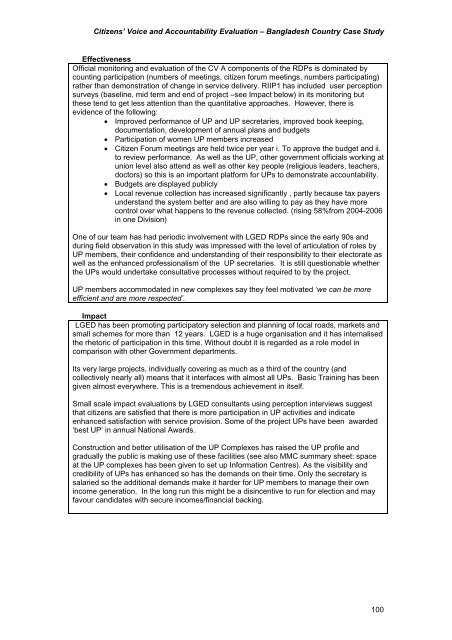Bangladesh - Belgium
Bangladesh - Belgium
Bangladesh - Belgium
You also want an ePaper? Increase the reach of your titles
YUMPU automatically turns print PDFs into web optimized ePapers that Google loves.
Citizens’ Voice and Accountability Evaluation – <strong>Bangladesh</strong> Country Case Study<br />
Effectiveness<br />
Official monitoring and evaluation of the CV A components of the RDPs is dominated by<br />
counting participation (numbers of meetings, citizen forum meetings, numbers participating)<br />
rather than demonstration of change in service delivery. RIIP1 has included user perception<br />
surveys (baseline, mid term and end of project –see Impact below) in its monitoring but<br />
these tend to get less attention than the quantitative approaches. However, there is<br />
evidence of the following:<br />
• Improved performance of UP and UP secretaries, improved book keeping,<br />
documentation, development of annual plans and budgets<br />
• Participation of women UP members increased<br />
• Citizen Forum meetings are held twice per year i. To approve the budget and ii.<br />
to review performance. As well as the UP, other government officials working at<br />
union level also attend as well as other key people (religious leaders, teachers,<br />
doctors) so this is an important platform for UPs to demonstrate accountability.<br />
• Budgets are displayed publicly<br />
• Local revenue collection has increased significantly , partly because tax payers<br />
understand the system better and are also willing to pay as they have more<br />
control over what happens to the revenue collected. (rising 58%from 2004-2006<br />
in one Division)<br />
One of our team has had periodic involvement with LGED RDPs since the early 90s and<br />
during field observation in this study was impressed with the level of articulation of roles by<br />
UP members, their confidence and understanding of their responsibility to their electorate as<br />
well as the enhanced professionalism of the UP secretaries. It is still questionable whether<br />
the UPs would undertake consultative processes without required to by the project.<br />
UP members accommodated in new complexes say they feel motivated ‘we can be more<br />
efficient and are more respected’.<br />
Impact<br />
LGED has been promoting participatory selection and planning of local roads, markets and<br />
small schemes for more than 12 years. LGED is a huge organisation and it has internalised<br />
the rhetoric of participation in this time. Without doubt it is regarded as a role model in<br />
comparison with other Government departments.<br />
Its very large projects, individually covering as much as a third of the country (and<br />
collectively nearly all) means that it interfaces with almost all UPs. Basic Training has been<br />
given almost everywhere. This is a tremendous achievement in itself.<br />
Small scale impact evaluations by LGED consultants using perception interviews suggest<br />
that citizens are satisfied that there is more participation in UP activities and indicate<br />
enhanced satisfaction with service provision. Some of the project UPs have been awarded<br />
‘best UP’ in annual National Awards.<br />
Construction and better utilisation of the UP Complexes has raised the UP profile and<br />
gradually the public is making use of these facilities (see also MMC summary sheet: space<br />
at the UP complexes has been given to set up Information Centres). As the visibility and<br />
credibility of UPs has enhanced so has the demands on their time. Only the secretary is<br />
salaried so the additional demands make it harder for UP members to manage their own<br />
income generation. In the long run this might be a disincentive to run for election and may<br />
favour candidates with secure incomes/financial backing.<br />
100

















